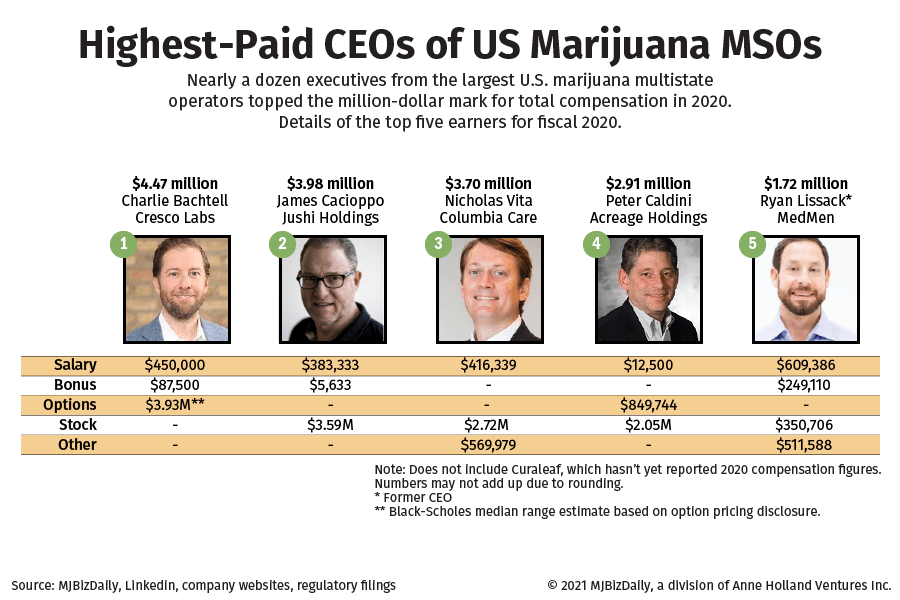The top executives at the largest U.S. marijuana multistate operators received roughly $500,000 to $1 million in salary and bonuses in fiscal 2020, with stock and option awards boosting total compensation packages to as much as $4.5 million, according to regulatory filings.
MJBizDaily found some mathematical mistakes and omissions in the executive compensation tables that companies filed with securities regulators, raising questions about disclosure practices in a rapidly growing industry where more operators are going public.
Ten CEOs topped the million-dollar mark in total compensation – although the highest amounts paled in comparison to some of their Canadian marijuana counterparts as well as chief executives in mainstream industries.
Several marijuana MSO executives below the rank of CEO also exceeded $1 million in compensation when including stock or option awards.
The fiscal 2020 numbers provide just a snapshot of executive compensation.
As in mainstream industries, cannabis company compensation packages can vary dramatically from year to year because of the fluctuation of equity awards.
Some companies, for example, provide stock or option awards to their top executives once every two years rather than every year.
By comparison, in 2019, some marijuana MSO executive compensation packages reached $20 million.
Of the leading 15 marijuana MSOs examined for 2020, only one was headed by a female CEO – Trulieve’s Kim Rivers – and the rest by white men.
Fred Whittlesey, a marijuana compensation expert and founder of the Seattle-based Compensation Venture Group, noted that he could write a “lengthy piece on all of the errors and incorrect disclosures in cannabis companies … there seems to be an industry-wide disregard for accuracy in securities filings.”
In addition, several MSOs disclosed equity awards in separate sections from their executive compensation summary table, but they did not include contingent, or estimated, values to those awards, as is customary in such reporting.
Whittlesey also was critical of that approach.
“Investors want to see everything on one page, all the numbers,” Whittlesey said. “Board members want to see everything on one page, all the numbers.
“If a company is not willing to provide full transparency on executive pay to all stakeholders, we need to question why that is.”
Top of the heap
Charlie Bachtell, chief executive officer of Illinois-based Cresco Labs, came in as the highest-paid CEO at a publicly traded marijuana MSO with 2020 compensation valued at $4.5 million.
Bachtell earned a salary of $450,000 and was paid a bonus of $87,500, according to a regulatory filing.
Most of Bachtell’s compensation came from a grant of 1.5 million stock options in May 2020.
The grant was disclosed in a separate section from the standard executive compensation summary table and did not have an estimated value of the options.
Whittlesey estimated the median value of the 1.5 million options at $2.62 a share, for a total of $3.93 million, employing the widely used Black-Scholes option pricing model based on pricing data in Cresco’s disclosure.
The options had an exercise price of $6.55 a share, according to Cresco’s regulatory filing, which represented a premium over the closing price of $4.55 a share on the day they were granted.
On Tuesday, Cresco’s stock (CRLBF) closed at $11 a share on the over-the-counter markets.
Cresco declined comment for this story.
Compensation breakdown for top multistate operators
| Name and company | Total compensation | Salary | Bonus | Stock | Options | Other |
|---|---|---|---|---|---|---|
| Charlie Bachtell, Cresco Labs | $4,467,000 | $450,000 | $87,500 | $3,930,000** | ||
| James Cacioppo, Jushi Holdings | $3,976,785 | $383,333 | $5,633 | $3,587,819 | ||
| Nicholas Vita, Columbia Care | $3,708,456 | $416,339 | $2,722,138 | $569,979 | ||
| Peter Caldini, Acreage Holdings | $2,912,245 | $12,500 | $2,050,001 | $849,744 | ||
| Ryan Lissack, MedMen* | $1,720,790 | $609,386 | $249,110 | $350,706 | $511,588 | |
| Benjamin Kovler, Green Thumb Industries | $1,659,438 | $307,500 | $972,881 | $339,127 | $39,930 | |
| Adam Bierman, MedMen* | $1,154,478 | $157,733 | $996,745 | |||
| Kim Rivers, Trulieve | $1,064,989 | $323,958 | $524,677 | $216,354 | ||
| Steve White, Harvest Health | $1,026,213 | $750,000 | $276,213 | |||
| Hadley Ford, iAnthus* | $1,006,000 | $1,006,000 | ||||
| Jason Ackerman, TerrAscend* | $862,000 | $333,000 | $529,000 | |||
| Jonathan Sandelman, Ayr Wellness | $850,000 | $425,000 | $425,000 | |||
| Kevin Murphy, Acreage Holdings* | $829,690 | $187,500 | $642,190 | |||
| Robert Groesbeck, Planet 13 | $806,857 | $288,000 | $472,951 | $45,906 | ||
| Larry Scheffler, Planet 13 | $806,736 | $288,000 | $472,951 | $45,785 | ||
| Randy Maslow, iAnthus | $675,000 | $675,000 | ||||
| Abner Kurtin, Ascend Wellness | $436,151 | $384,808 | $50,143 | $1,200 | ||
| George Archos, Verano Holdings | $425,000 | $375,000 | $50,000 | |||
*Former CEOs. Ackerman's salary figure doesn't include what he earned as interim CEO between Jan. 28, 2020 and April 14, 2020.
**Black-Scholes median range estimate based on option pricing disclosure.
“Other” compensation in the table includes executive protection services, the value of annual incentive plans and other benefits.
James Cacioppo, the chief executive of Florida-based Jushi Holdings, was the second-highest-paid CEO of a multistate operator with 2020 compensation of nearly $4 million.
His salary and bonus totaled less than $400,000, but Cacioppo was granted two restricted stock awards that inflated his compensation package.
Those grants were disclosed separately from the executive compensation summary table without contingent values. MJBizDaily calculated the contingent value of the equity awards based on the pricing information.
A second Jushi executive also topped the million-dollar mark for executive compensation in 2020.
Erich Mauff, Jushi’s president, had a total compensation package of nearly $2 million when counting two restricted stock grants, which were disclosed separately from his 2020 salary of $316,666. MJBizDaily calculated the value of the stock awards.
Nicholas Vita of New York-based Columbia Care was the third-highest-paid MSO chief executive with 2020 compensation valued at $3.7 million.
The bulk of his compensation package also was in the value of stock awards: $2.7 million.
The value of Vita’s 2020 compensation paled in comparison to his 2019 package of $19.7 million, which included stock awards valued at $19 million.
Former Pfizer executive Peter Caldini, who became Acreage Holdings’ CEO in December, earned $2.9 million in compensation in 2020. The compensation came almost entirely from stock and option awards, according to regulatory filings.
Stock and/or option grants are typical to attract new executives, compensation experts said.
Disclosures and errors
Other million-dollar marijuana executives during fiscal year 2020 were:
- Ryan Lissack, former interim CEO of Los Angeles-based MedMen Enterprises: $1,720,790, which was bolstered by bonuses and stock awards.
- Benjamin Kovlar, CEO of Illinois-based Green Thumb Industries: $1,659,438, boosted by a nearly $1 million bonus.
- Adam Bierman, former MedMen CEO: $1,154,478, which included a salary of $157,733 and $996,745 in “other” compensation. The “other” compensation consisted of $890,561 in estimated “executive protection” services and $106,183 for a car lease and insurance, according to a footnote to the table. There were mathematical errors in the executive compensation table, which under-reported Bierman’s total compensation as $959,233. MedMen spokeswoman Lauren Claffey Tomlinson noted that Bierman resigned as CEO on February 1, 2020, and “any compensation in 2020 was part of his severance and the final stages of his employment agreement. Any potential math errors will be addressed in subsequent amendments.”
- Kim Rivers, CEO of Florida-based Trulieve: $1,064,989, which included option awards valued at $524,677.
- Steve White, CEO of Arizona-based Harvest Health & Recreation: $1,026,213, which included $750,000 in salary.
- Hadley Ford, former CEO of New York-based iAnthus: $1,006,000 in salary. Ford resigned on April 27, 2020.
Massachusetts-based Curaleaf, the largest U.S. multistate operator by revenue, hadn’t filed a proxy statement with 2020 executive compensation figures as of July 6.
But former Curaleaf CEO Joe Lusardi earned total compensation of $2.9 million in 2019, excluding the value of 130,078 stock options. Two stock grants and the option award were listed separate from the executive compensation table and did not include estimated values.
Illinois-based Verano Holdings – whose CEO, George Archos, received $425,000 in total compensation in 2020 – also listed “compensation securities” separate from its executive compensation table.
The company didn’t disclose what the grants were. Instead, it wrote that “the issuance of compensation securities to named executive officers and directors will be determined in the future based on performance goals as determined by the Resulting Issuer Board and/or the Compensation Committee.”
Toronto- and New York-based TerrAscend listed the executive compensation of former CEO Jason Ackerman at 424,000 Canadian dollars, equivalent to $333,000 in U.S. dollars at the time.
The $333,000 covered the eight months that Ackerman served as CEO, based on an annual salary of $500,000, TerrAscend Chief Financial Officer Keith Stauffer noted in an email to MJBizDaily.
TerrAscend didn’t list what Ackerman received in salary while he was interim CEO between Jan. 28, 2020, and April 14, 2020.
Ackerman also received a $529,000 bonus in U.S. dollars for his 2020 services, according to a separate section in the 40-page proxy filing. Compensation experts said the bonus should have been included in the 2020 executive compensation table.
“The bonus was reported in a footnote as pertaining to 2020 but was paid out in 2021 so will not be reported in the table until 2021,” Stauffer wrote in his email.
Big swings in compensation
Whittlesey noted that executive compensation is often bumpy.
While salary and bonuses might be straightforward, he cautioned against reading too much into stock and option awards in any year given their volatility.
There’s often “wild year-to-year swings,” he said.
For example, companies might give new hires large stock and option grants and bonuses. They also might grant such awards to executives one year but not the next, depending on retention and pay-for-performance strategies.
“To me, the most important thing to remember when you open a proxy and look at the summary of compensation is that it’s not pay. It’s what securities regulators have decided is pay,” Whittlesey said.
In other words, theoretical or contingent values are assigned to option and stock awards, but the ultimate payout will depend on such factors as vesting schedules, stock price performance, how many options are exercised, how long the executive stays.
“There’s more turnover in the cannabis sector than across general industry,” Whittlesey noted. “People are being hired, people are leaving. All of this creates more bumps (in compensation). Then you add market volatility and the pandemic and all of those things.”
In addition, as a “high-growth, very entrepreneurial young industry, cannabis companies are all over the map in compensation design,” including stock vesting schedules, he said.
Acreage, MedMen pull back
The steepest declines in executive compensation packages from 2019 to 2020 were at Acreage Holdings and MedMen, both of which have retrenched to bolster their finances.
For example, in 2019, former Acreage CEO Kevin Murphy, Chief Operating Officer Robert Daino and Executive Vice President of Corporate Development Tyson Macdonald each received compensation packages of $17 million, almost entirely because of stock awards.
In fiscal year 2019, MedMen granted $7.4 million in compensation to then-CEO Adam Bierman and $6.2 million to then-President Andrew Modlin. Their packages included bonuses of $4 million each.
The highest compensation packages at American MSOs were more modest than at Canadian marijuana businesses.
For example, Toronto-based Cronos Group paid CEO Kurt Schmidt more than $10 million in total compensation in 2020 even as the company continued to lose money.
Canopy Growth CEO David Klein received a partial-year compensation package valued at $33.8 million in the company’s 2020 fiscal year ended March 31, 2020.
A survey of the 200 highest-paid CEOs at publicly held companies conducted for The New York Times by the executive compensation firm Equilar showed some of the largest pay packages ever – including one valued at $1.1 billion for the CEO of a data-mining company.
Pandemic impacts
Kara Bradford, founder and CEO of Viridian Staffing, a Seattle-based marijuana recruitment agency, said she saw marijuana plant-touching and ancillary companies across the board offering lower executive salaries in the early part of 2020.
“Companies were just being more conservative when they didn’t know how COVID was going to affect them,” Bradford said.
Total executive compensation packages in 2020 were about the same as the year before, she said, because of incentives such as bonuses, equity and options.
“Once we got to October, November, things started to pick up a bit” and salaries have been more robust so far in 2021, Bradford said.
She and Whittlesey emphasized that securities grants are “future promises of stock,” which often are contingent on vesting schedules.
Bradford said she has heard stories of marijuana executives being let go just before incentives were scheduled to pay out or vest. It reminded her of what went on in the industry a few years ago.
“Is it common that happens when companies are new? Yes, if a company is not performing,” Bradford said. “But it is enough of a trend that I’m alarmed like I was in 2017.”
San Diego-based recruitment firm Cannabiz Team’s second-quarter 2021 survey shows that executive salaries are strong so far in 2021, up about 10% year-over-year for cultivation, distribution, retail, marketing and finance directors.
Pay is increasing “because the market is more competitive and (higher salaries are needed) in order to attract better talent,” Liesl Bernard, CEO of Cannabiz Team, told MJBizDaily.
Competitive demand for top talent especially is pronounced in emerging or prospective adult-use markets such as Arizona, Illinois, Michigan, New Jersey and New York, according to Bernard.
She noted that the industry has experienced strong growth after most states deemed marijuana operations “essential” during the pandemic.
“That was a big bonus for the cannabis industry and legitimized the industry as well,” she said.
She said many cannabis companies are in a better cash-flow position and have easier access to funding. As a result, they are able to offer higher salaries to pull in high-caliber talent from other industries such as consumer packaged goods, retail and pharmaceutical.
Jeff Smith can be reached at jeff.smith@mjbizdaily.com.







